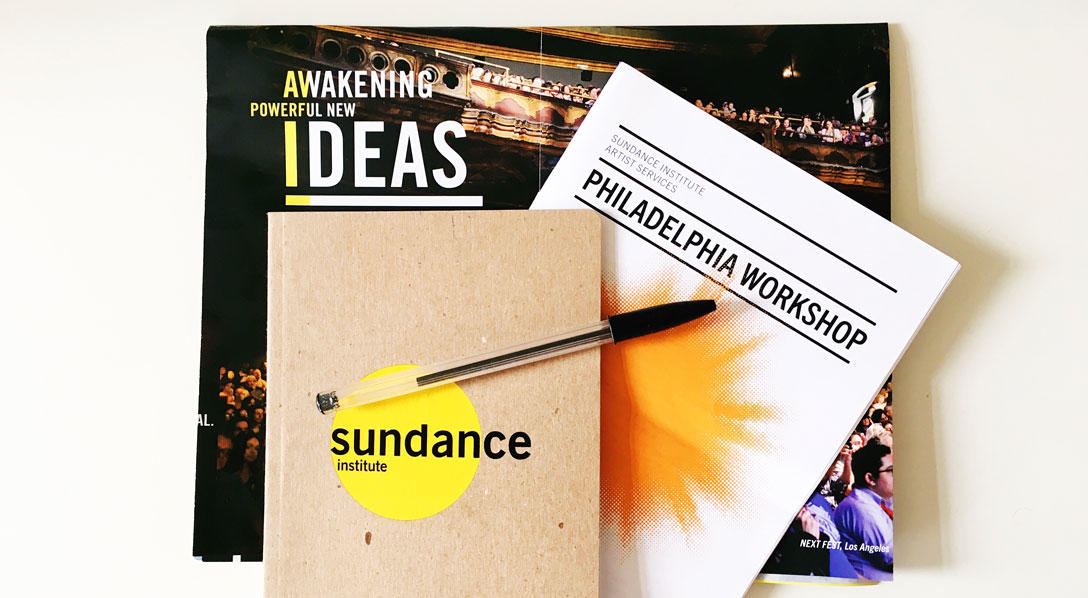Shannon Beeby
It can be easy to forget that everyone starts somewhere. We are often so preoccupied with our own distorted sense of inadequacy and dazzled by “sound bite” stories of overnight success, that we miss the true and abiding comfort that can be found in uncovering the far more frequent stories of failure>investigation>persistence>wisdom that culminate in hard won success.
In a conversation with, Joseph Beyer, director of digital initiatives at Sundance Institute, he asked, “So what was your take away?” If I could sum up one of the most profound benefits of attending Sundance Institute’s #ArtistServices Philadelphia Workshop, it would be that no matter how green you are when you begin – If you embrace your failures with an insatiable appetite to learn and improve, and funnel your passion into inspired strategy – You can overcome all odds and make a living telling the stories that drive you.
To me, this is the definition of empowerment. Both Joe, and Chris Horton, who is the director of Artist Services at Sundance Institute, moderated an impactful lineup of speakers and case studies with a solid footing in reality, while also maintaining an awareness that everyone, at some point, begins from square one.
The Sundance Institute #ArtistServices Workshop(s) offers a powerful tool of self-examination: “How bad do you want it?”
Or, better yet, “Does your passion and purpose outweigh the heartache and headaches you will most likely incur on the daily?”
Or even better still, “Can your higher purpose transform leaping over the many hurdles ahead of you into experiences that you value, as opposed to trials that you begrudgingly endure in order to achieve a predetermined definition of success?“
Depending on where you’re at on the “Green-to-Experienced” Scale, you may attend your first #ArtistServices Workshop and be gobsmacked by how much there is to learn and do in order to become a self-sustaining filmmaker. In all honesty, if you flirt with thoughts like, “Heck! Indie filmmaking is so easy these days,” the workshop will swiftly put to rest any notions you may have had about, “All I have to do is whip out my iPhone and churn out a Tangerine. Or record a bunch of creepy night vision footage and make bonafide Paranormal Activity-grade moolah!”
Not so much.
If easy money motivates you, filmmaking is not the profession that you are seeking. Money may, or may not, come. But regardless, neither scenario will be easy.
Despite many complaints I hear from the old guard about how, in this day and age, everyone is working harder for less money, I’d like to redirect our attention to a key word in that complaint – everyone.
The advent of technology supported innovations like crowdfunding and OTT content distribution, and even free video tutorials, has made being a filmmaker more accessible than ever before. With unprecedented access to data, anyone with a passionate desire to do so can boil down the key ingredients that make up the marketing and distribution strategies of large studio driven films into a dense, flavor-packed, mirepoix that can be utilized on a hyper-targeted scale.
Does this mean there is potential for an oversaturated market? Yes, perhaps. But I see a more profound potential for a reshaping of the marketplace into an ecosystem that lends itself to sustaining more passion-driven projects, and less profit-driven projects.
In order to tolerate the intense amount of work needed, you have to be passionate about what you are sharing with the world, and doubly so because you will not be purchasing a yacht with your bounty. The attraction toward “fame and fortune” has been a huge part of the allure of the entertainment industry for a long time now, and I ponder the question, “Has that desire really helped foster an environment that nurtures storytelling that will make a positive impact on our society?”
Positive impact can come in many, many forms. Not one genre or artistic sensibility is necessarily more effective than the other. Profit can be garnered in conjunction with making a positive impact, but, I do believe that it all comes down to what the primary motivation is – profit or positive impact. Ultimately, you want both.
You want to be able to continue making films and not go bankrupt. Yet, if profit is held as the primary motivation, which arguably is the case for a lot of the huge studio-driven projects, then the positive impact can become pretty watered down. In contrast, if the positive impact is held as the primary motivation and creative principles of marketing and distribution are applied, then the integrity remains intact and profit comes as a well-deserved byproduct. And by “profit” I mean, most likely just enough to tell the next story with.
So, in a sense it is a great thing for our industry to have more and more “ROI-driven investors” becoming disimpassioned with “the movie business.” Because how often have we heard the story of the integrity of a film being compromised because of pressure from outside investors?
This new paradigm in funding, marketing, and distribution that we are in the midst of allows for a diverse populist channel within the marketplace that opens the door to perspectives and stories that would’ve never been given consideration by the “ROI-driven investors” of the past. They knew that the only way to stay afloat was to exploit mass appeal. Now we are stepping into an era of our industry in which the internet has already well illustrated the power of the niche market.
This era also inspires and demands creativity, in all aspects – fundraising, budgeting, production, marketing, and distribution. It takes a lot of research, hard work, and dedication, but if we allow whatever our unique personal “higher purpose” is to motivate us in telling and sharing stories, it will help us leap over those hurdles, and progressively gain more wisdom and ability.
This is a new frontier. Enjoy the view.
This blog was originally published by Bee Nest Films.



